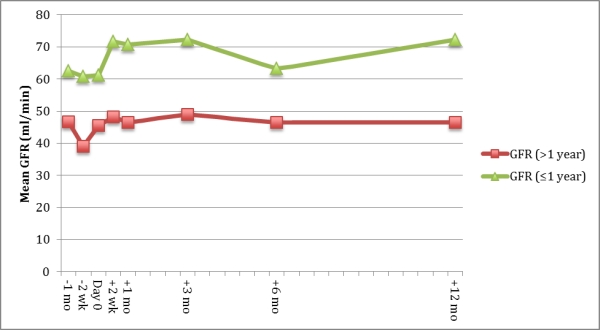Improved Renal Function Post-Liver Transplant With Earlier Everolimus Conversion
1Pharmacy Dept, University of Colorado Hospital, Aurora
2Division of Transplant Surgery, Medical College of Wisconsin, Wisconsin
3Division of Gastroenterology/Hepatology, University of Colorado, Aurora
4Division of Transplant Surgery, University of Colorado, Aurora.
Meeting: 2015 American Transplant Congress
Abstract number: A218
Keywords: Immunosuppression, Liver transplantation, Renal function
Session Information
Session Name: Poster Session A: Liver: Immunosuppression and Rejection
Session Type: Poster Session
Date: Saturday, May 2, 2015
Session Time: 5:30pm-7:30pm
 Presentation Time: 5:30pm-7:30pm
Presentation Time: 5:30pm-7:30pm
Location: Exhibit Hall E
Calcineurin inhibitors (CNI) play an important role in preventing acute rejection (AR) post-liver transplant. Its long-term use is limited by development of nephrotoxicity. Optimal timing of everolimus (EVL) initiation, either with reduced dose CNI or as monotherapy, to minimize nephrotoxicity has yet to be defined.
Methods: This is a retrospective study describing our programmatic experience with conversion from CNI- to EVL-based immunosuppression in post-liver transplant recipients. All patients currently receiving EVL were eligible for inclusion. The primary outcome was renal function (GFR based on MDRD) measured at 2 weeks, 1 month, 3 months, 6 months and 1 year post-conversion. Secondary outcomes include incidence of biopsy-proven ACR and EVL tolerability.
Results: Forty patient episodes of conversion to EVL-based immunosuppression were evaluated. Patients were converted to EVL at a mean of 59 months (range, 2-306) post-liver transplant. Mean GFR at time of conversion was 50.7 ml/min and 56.3, 54.1, 54.8, 51.5 and 53.3 ml/min at 2 weeks, 1 month, 3 months, 6 months and 1 year post-conversion, respectively. Baseline GFRs were similar between patients converted within the first year post-transplant (n=12) and those converted after the first year (n=28) (62.5 vs 46.6 ml/min, p=0.05). Patients converted within the first year had a greater GFR at 1 year post-conversion (72.3 vs 46.5 ml/min, p=0.005).  Biopsy-proven AR was seen in 1 patient. Thrombosis was observed in 2 patients and 3 patients reported mouth sores.
Biopsy-proven AR was seen in 1 patient. Thrombosis was observed in 2 patients and 3 patients reported mouth sores.
Conclusion: EVL-based immunosuppression post-liver transplant appears to preserve renal function with minimal risk for AR. Conversion within the first year post-transplant may be beneficial in preventing early loss of renal function.
To cite this abstract in AMA style:
Lin S, Zimmerman M, Lewis V, Biggins S, Ruller C, Kam I, Nydam T. Improved Renal Function Post-Liver Transplant With Earlier Everolimus Conversion [abstract]. Am J Transplant. 2015; 15 (suppl 3). https://atcmeetingabstracts.com/abstract/improved-renal-function-post-liver-transplant-with-earlier-everolimus-conversion/. Accessed February 25, 2026.« Back to 2015 American Transplant Congress
